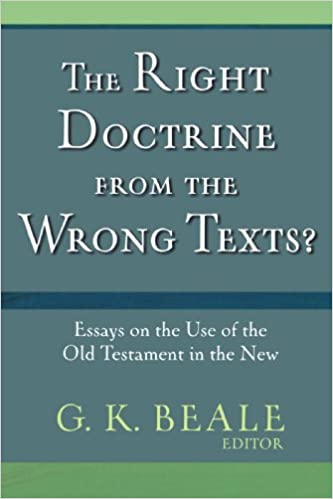A Brief Book Summary from Books At a Glance
By Benjamin J. Montoya
About the Author
G. K. Beale (PhD, University of Cambridge) is visiting professor of New Testament at Westminster Theological Seminary in Philadelphia. He is the author of five books, including commentaries on Revelation and 1 and 2 Thessalonians, and The Temple and the Church’s Mission.
Introduction
When we look at how the NT cites the OT, what do we make of it? Do we see the NT authors consistently citing the OT in a way that we would expect? Or do we see something else? We may have heard of the term “typology,” but what is it? This seminal volume tackles these larger questions, and more, for the sake of understanding this much larger issue. This volume also contains a wide variety of perspectives to consider given the larger complexity of this topic. Consider our summary to learn more!
Table of Contents
Part 1 Introductory Issues
Chapter 1 The New Testament Use of the Old Testament
Roger Nicole
Chapter 2 The Use of the Old Testament in the New
Klyne Snodgrass
Part 2 Were the New Testament Authors Faithful to the Old Testament Authors’ Intention?
Chapter 3 The Single Intent of Scripture
Walter C. Kaiser, Jr.
Chapter 4 The Fallacy of Equating Meaning with the Human Authors’ Intention
Philip Barton Payne
Chapter 5 Divine Meaning of Scripture
Sheridan Poythress
Chapter 6 The Formula-Quotations of Matthew 2 and the Problem of Communication
R. T. France
Part 3 Did the New Testament Authors Respect the Context of the Old Testament Text? Opposing Arguments
Chapter 7 The Place of the Old Testament in the Formation of the New Testament
Barnabas Lindars
Chapter 8 Matthew Twists the Scriptures
S. V. McCasland
Chapter 9 A Dissenting Opinion about Respect for Context in the Old Testament Quotations
Richard T. Mead
Part 4 Did the New Testament Authors Respect the Context of the Old Testament Text? Affirmative Arguments
Chapter 10 The Old Testament in the New
C. H. Dodd
Chapter 11 Response against C. H. Dodd’s View: On Testimonies
Albert C. Sundberg, Jr.
Chapter 12 Counter-Response in Favor of C. H. Dodd’s View
I. Howard Marshall
Chapter 13 The Old Testament Background of Reconciliation in 2 Corinthians 5—7 and Its Bearing on the Literary Problem of 2 Corinthians 6:14–7:1
G. K. Beale
Chapter 14 Luke and Isaiah
David Seccombe
Chapter 15 The Use of the Old Testament in Revelation
G. K. Beale
Part 5 Did the New Testament Authors Respect the Context of the Old Testament Text? Two Perspectives on Paul’s Use of Exodus 34 in 2 Corinthians 3
Chapter 16 Beyond the Things That Are Written? Saint Paul’s Use of Scripture
Morna D. Hooker
Chapter 17 The Glory and Veil of Moses in 2 Corinthians 3:7–14
Scott J. Hafemann
Part 6 How Did the New Testament Authors Use Typology?
Chapter 18 Typology and the Christian Use of the Old Testament
David L. Baker
Chapter 19 Introductory Notes on Typology
G. P. Hugenberger
Chapter 20 The Acts of God: A Study of the Basis of Typology in the Old Testament
Francis Foulkes
Part 7 Should the Exegetical Methods of the New Testament Authors Be Reproduced?
Chapter 21 Negative Answer to the Questions “Who Is the Prophet Talking About?” Some Reflections on the New Testament’s Use of the Old
Richard N. Longenecker
Chapter 22 Positive Answer to the Question Did Jesus and His Followers Preach the Right Doctrine from the Wrong Texts?
G. K. Beale
Part 1: Introductory Issues
Chapter 1: The New Testament Use of the Old Testament
Roger Nicole
The NT regularly uses, or cites, the OT. There are several hundred different kinds of citations. How are we to understand these citations? Some scholars claim that because these citations differ from what we might expect today, that these citations pose problems for a high view of Scripture that affirms verbal plenary inspiration. Is that so? We must remember to understand the citations of the OT by NT authors on their own terms. They did not have the same standards of a citation we do today. Plus, they were translating their citations from Hebrew/Aramaic into Greek. Other times they were making allusions to texts without intending to cite the texts themselves. Thus, even if we come across an example that is hard to explain, that does not mean we have issues with our doctrine of Scripture. Rather, the issues may simply be with our expectations of the authors themselves. . . .
[To continue reading this summary, please see below....]The remainder of this article is premium content. Become a member to continue reading.
Already have an account? Sign In
